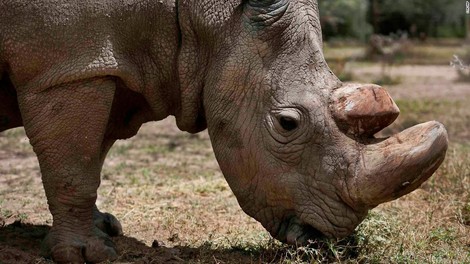Your podcast discovery platform
Curious minds select the most fascinating podcasts from around the world. Discover hand-piqd audio recommendations on your favorite topics.

piqer for: Climate and Environment Globalization and politics Deep Dives
Annie Hylton is an international investigative journalist from Canada. She writes about gender, immigration, human rights, and conflict, and has worked in East Africa, the Middle East, Central America, and elsewhere. She teaches journalism at Sciences Po in Paris and was a former international lawyer focusing on situations of conflict. Hylton is a graduate of Columbia University’s Stabile Center for Investigative Journalism and also holds a J.D. and Master of Laws in international humanitarian law.
What We Can Learn From The Death Of The Last Male Northern White Rhino
Sudan was the world's last remaining male northern white rhino. He died this week at the age of 45. Only two northern white rhinos remain on earth; they are Sudan's direct descendants – his daughter and granddaughter. What does Sudan's death tell us? According to Jill Filipovic, the author of the CNN piece:
This majestic species has been all but wiped out by poaching, and may soon face the fate of the northern black rhino: extinction.
Sudan lived at Ol Pejeta Conservancy in Kenya, where he was protected from hunters by an armed security detail. Filipovic argues that the illicit trade in rhino horn continues to thrive – despite poachers risking death to capture such species – because of international market demand and, for poachers, mere survival and economic need.
China and Vietnam use rhino horns for traditional medicine, and, while China banned ivory in 2017, it has long driven demand for it. In the U.S., President Trump is equally to blame: his "America First" strategy and neglect of African people and emerging economies on the continent allows poaching to thrive. His sons, Eric and Donald Trump Jr., hunt big game and glorify it.
According to Filipovic, this thinking has a direct impact on policy in the U.S. An advisory board tasked with rewriting federal rules for importing animal parts from Africa is stacked with trophy hunters. Or, in Filopovic's words, "people whose idea of fun is to travel to largely impoverished nations in order to spend thousands of dollars slaughtering majestic creatures."
The people who are key to saving these majestic creatures – scientists, researchers, and conservationists who are against foreigners hunting big game – must be heard by U.S. policy-makers.
The death of Sudan must not be in vain, Filipovic writes. The world must do more to invest in the protection of such species; it must also do more to alleviate the suffering of the people who depend on the trade.
